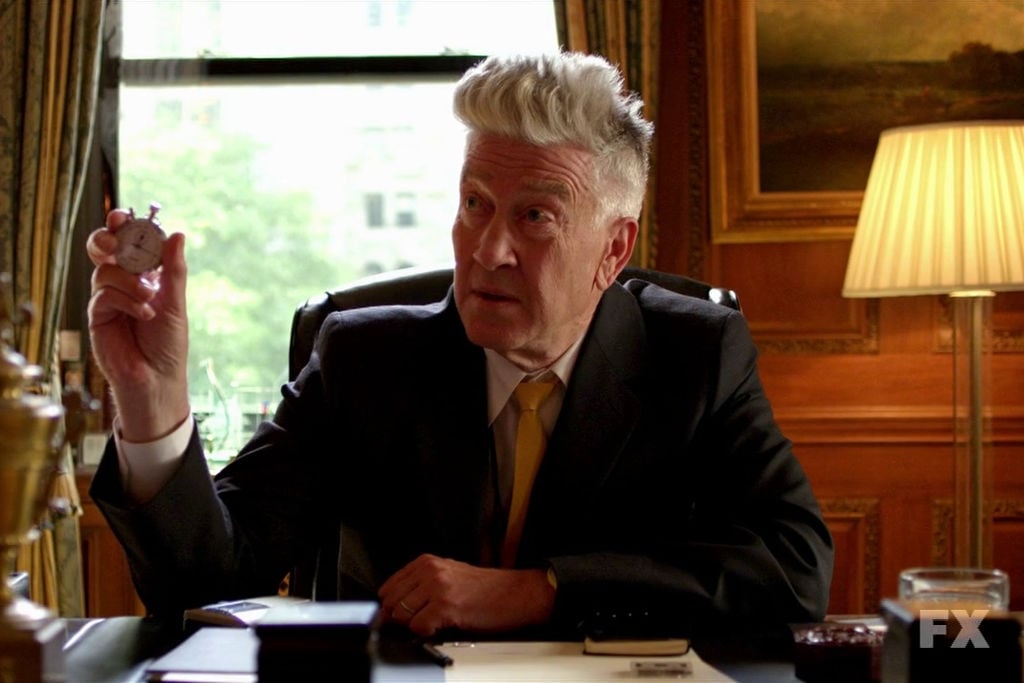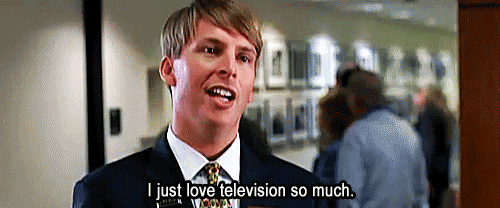David Lynch’s Impact On Modern Television Is Much Vaster And More Complicated Than Simply ‘Twin Peaks’
Think you know all there is to know about David Lynch and television, Twin Peaks fans? Think again.

If you’re thinking about David Lynch’s adventures on the small screen, you’re probably thinking about Twin Peaks. That’s understandable. The show’s wrapped-in-plastic homecoming queen, coffee-loving FBI agent, dancing man from another place, log lady and sinister force that is Bob are all etched into popular consciousness.
As the program’s impending revival – and the will-he-or-won’t-he saga around Lynch’s involvement – has recently proven, the filmmaker has become as synonymous with the small-town murder mystery series he co-created as its fictional characters Dale Cooper and Laura Palmer. When he temporarily withdrew from the forthcoming third series over a budget dispute, the original cast made a public plea to the US cable network putting up the funding.
“It just wouldn’t be Twin Peaks without David Lynch,” was their cry. They were right. He returned.
There are plenty of reasons why affection for Lynch and Twin Peaks just won’t fade: the show’s surreal spin on the soap opera; its twist on the usual crime procedurals; its mining of suburban horrors; its hearty and prescient embrace of television as art. Claims that the series helped carve out today’s prestige TV landscape and marked the rebirth of TV drama are common, and accurate.
But Twin Peaks wasn’t Lynch’s only small screen outing — nor is it the only show he’s made that has proven influential (and we’re not just talking about Mulholland Drive‘s origins as a failed TV pilot). In fact, the mind behind movies such as Eraserhead, Blue Velvet, and Lost Highway tried his hand at television both before and since — it’s just that most of his TV outings didn’t spark a cult following, and have been harder to come by since their debut.
–
The Cowboy and the Frenchman: Culture Clash Comedy, Lynch-Style
Lynch started dabbling with television in the late ’80s, with his contribution to French anthology, France As Seen By. It was here he began toying with culture clash comedy, too.
The 25-minute episode was part of the 10th anniversary celebrations for Le Figaro‘s magazine section, with the French newspaper commissioning a five-episode television series that took a comic look at the country through the eyes of others. Five foreign directors were asked to offer their perspectives, including Germany’s Werner Herzog, Poland’s Andrzej Wadjda, Italy’s Luigi Comencini, and Swiss-French auteur Jean-Luc Godard – and while the end results of France As Seen By… are a mixed bag, it’s hardly surprising that Lynch’s slapstick contribution stands out.
Using humour to tackle diversity isn’t new, nor was it in 1988, but Lynch’s contribution — The Cowboy and the Frenchman — doesn’t feel like the usual sitcoms that highlight differences and champion acceptance. Instead, like most of his work, it takes familiar components, filters them through his particular sensibilities, and shapes them into something unusual. Lynch doesn’t just show the way that Americans see France, which was the brief he was given. In his usual offbeat fashion – and in a stylised riff on one his nation’s favoured genres, the western – he parodies the US and its reaction to outsiders.
His trademark absurdity is evident, but The Cowboy and the Frenchman shines brightest when it’s toying with stereotypes. The visitor from France arrives wearing a beret and carrying a suitcase filled with wine, cheese, baguettes, snails and French fries, while the rancher dons the customary chaps, hat and boots, and is flanked by two ever-present off-siders. Their conversations are one-sided, the cowboy shouting his opinions while ignoring everyone else. A title card explains that an injury has left him hard of hearing, but every blunt, clueless interaction offers an obvious dig at the way America is seen to engage with the rest of the world.
Combining silliness with a statement, it’s a predecessor to the kind of comedy that South Park has traded upon for years, as well as the farcical take on international relations and politics that serves a show like Veep so well.
–
There’s Showbiz Sitcoms, And Then There’s This Showbiz Sitcom
Of course, The Cowboy and the Frenchman won’t be what springs to most people’s minds when they’re contemplating Lynch’s TV comedy efforts. That honour belongs to Louie, with the filmmaker’s involvement across a three-episode arc in its third season one of the greatest television casting coups ever.
Lynch stole every scene he was in as the experienced mentor primed to prepare Louis C.K.’s on-screen alter ego for a shot at replacing David Letterman. It wasn’t just a savvy performance – it also returned him to the world of showbusiness-related TV comedy that he first dallied with two decades earlier.
In 1992, Lynch reunited with Twin Peaks’ co-creator Mark Frost for On the Air. Their second stab at a fictional television series couldn’t have been more of a departure from the show they’re still both best known for, peeking behind the scenes of a 1950s variety program. The goings on at the fictional The Lester Guy Show are the stuff TV sitcoms about TV are made of: fighting co-stars, on-air stuff-ups, meddling executives, and eccentric off-screen personalities included. In fact, even if you haven’t seen it (it only lasted three weeks on America’s ABC network, however seven episodes were filmed), it still probably sounds familiar.

The Larry Sanders Show and Studio 60 on the Sunset Strip followed the same formula, with their own twists and senses of humour. It’s On the Air‘s specific brand of amusement that sets it apart, however; think slapstick mixed with the over-the-top theatrics of Twin Peaks‘ own show-within-a-show, Invitation to Love, and you’re probably still not quite prepared for its broad jokes and lurching tonal shifts. It’s frequently hilarious, and at its best when juggling the things that inevitably go wrong when the cameras start rolling.
It’s also impossible to watch the first episode – which Lynch and Frost co-wrote, and Lynch directed – and not think about its influence upon 30 Rock, its showbiz sitcom heir apparent.
–
An Anthology, Just Like They Used To Make
After the failure of On the Air, Lynch’s second cancelled TV show in as many years, the director tried a different tact for the small screen. He returned to the moodiness and mystery that served Twin Peaks so well, but carved it up into bite-sized pieces – three, actually, because that’s how brief Hotel Room‘s 1993 run was. Where each episode is set is obvious from the show’s name, but the series doesn’t just chart the everyday goings-on in its location. Each installment stays in the same room, tracking different characters in different years, with the hotel’s maid and bellboy the only recurring figures.
Hotel Room is an anthology series – and yes, you’ve heard that term quite a bit lately. It was splashed around last year when True Detective and Fargo were the hottest things on TV, and will be splashed around again when both shows return for their second outings later in 2015. When each debuted, their mini series-like approach to confining their tales within discrete seasons was celebrated, as was the rebirth of the style. American Horror Story has also been applauded for adopting a method of television storytelling otherwise largely overlooked in recent times.
It’s easy to label the varied three episodes of Hotel Room as a precursor to contemporary TV compendiums, focusing on self-contained narratives, creating a strong sense of mood, and splicing its parts together by theme rather than through a unified, ongoing story. Lynch’s anthology effort – one that he co-created with Wild at Heart author Barry Gifford, produced, and also directed the first and third episodes of – also acts as stepping-stone between today’s season-long style and the episodic likes of The Twilight Zone and The Outer Limits decades earlier.
Perhaps Hotel Room is best seen as a piece of the TV puzzle that nods to the old, while paving the way for the new. Indeed, that’s Lynch’s modus operandi: synthesising his ideas and influences into something unique that then inspires others. He’s worked that magic on the big screen for decades, after all, even if he hasn’t made a feature since 2006’s Inland Empire.
On television, he’s known for casting his spell with Twin Peaks, and no doubt will continue to do so with its revival, too — but there’s more to his small screen impact. In fact, you’ve been watching programs influenced by The Cowboy and The Frenchman, On the Air and Hotel Room for decades.
–
The David Lynch: Between Two Worlds exhibition is running at Brisbane’s Gallery of Modern Art until June 7.
–
Sarah Ward is a Brisbane-based writer and film critic. She writes for artsHub, Concrete Playground and FilmInk, talks about film on ABC radio, and tweets at @swardplay.